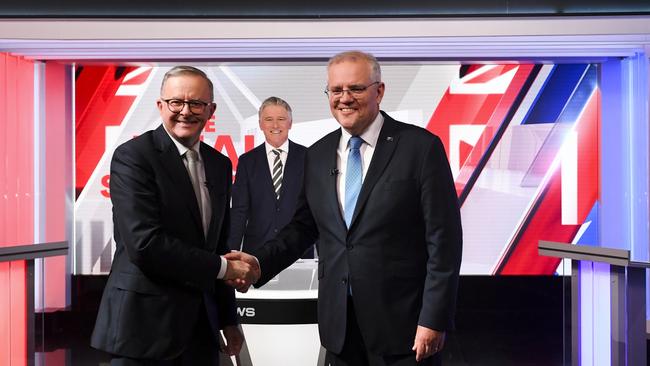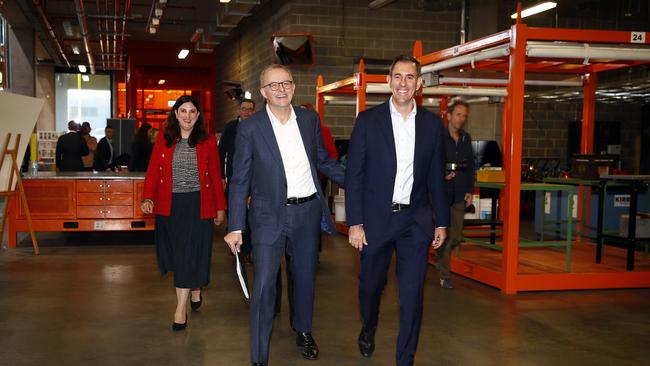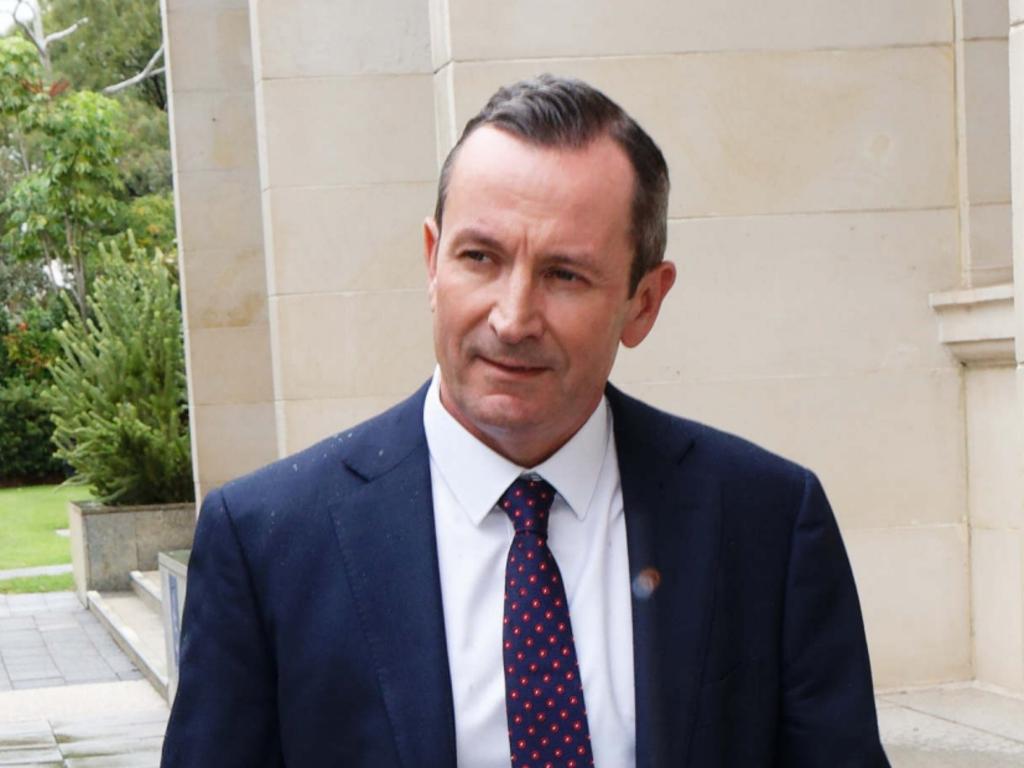The Albo experiment: is he up to the job?
If the polls are correct, a remarkable event is going to unfold.

As a nation we have not been here before. But with three leaders’ debates under his belt Albanese has held his position as frontrunner, shown he is at least competitive with Scott Morrison and, after five weeks of campaigning, has defied critics who once insisted he was never a tenable candidate for the job.
An Albanese victory will break the “rules” of Australian politics – that Labor wins from opposition only under a dynamic leader with a substantial change agenda – witness Gough Whitlam in 1972, Bob Hawke in 1983 and Kevin Rudd in 2007. Albanese has never grabbed the public imagination. He still hasn’t. There are no big ideas in his agenda, no sweeping visions, just modest initiatives sugar-coated with appealing rhetoric.
Despite the new glasses and the weight loss, Albo is still Albo – “I am who I am,” he says. His biggest virtue is personal rapport. He connects with the public better than Morrison – and that helps him recover from multiple blunders. He doesn’t necessarily have the stature of a prime minister but he comes over as a good bloke, an Aussie battler, unpretentious, sincere, authentic.
When Albo says “the people deserve better” it resonates. When he says “the cost of everything is going up but your pay isn’t” – the most repeated cliche of the campaign – it rings true for many people. Albanese runs on what I have called compassion politics – from childcare to aged care. “No one held back, no one left behind,” is his people mantra. He talks constantly about his beliefs – and beliefs are cost-free. He talks less about his policies – they come with a price tag.
The 2019 result proved no election is in the bag. Morrison could yet spring another surprise. He cannot be written off. Will media projections of a Labor win drive people back to “the devil you know”? But Labor expects to win, the Morrison government admits it is behind and the polls point to a Labor victory. Albanese is now facing media questions about his program during his first 100 days in office. Confounding analogies are being drawn. Will Albanese be a repeat of Whitlam’s blunders, or Hawke’s consensus or Julia Gillard’s minority government? If it is minority government, Albanese as leader of house under Gillard has had the perfect preparation, given his superb parliamentary management at that time.
Albanese’s assault on Morrison’s character has worked beyond expectations. As a vote turner, dislike of Morrison is far stronger than attraction for Albanese. But the focus on Morrison meant far less scrutiny of Labor until the campaign proper – and that was a major plus.
All new governments are experiments but any Albanese government will represent a bigger experiment than usual. Is Albanese up to the job? His real task as prime minister will be to win the public confidence still held in reserve despite any election win. Albanese will feel that. Unlike Hawke, whom the public knew, Albanese remains an untested persona for most people. He has, however, left clues about how he might govern.

The PM whose model he most admires is Hawke. In Albanese’s reinvention of himself he aspires to consultation and consensus, the only trouble being Hawke cannot be duplicated. Albo says “one of my first acts” will be to convene a summit bringing employers and unions together to sort an employment and industrial relations agenda. That’s hard – it’s a huge test, but it’s worthwhile.
He can be expected to run a cabinet like Hawke – setting the direction but not micromanaging his ministers. Albo will see his skill in tactics and strategy. He is not a policy wonk and doesn’t have a policy mind; witness the campaign blunders. But he is neither a narcissist nor an intellectual egoist. Albo will never think he is the smartest brain in the room. His feet will stay firmly on the ground. The leader he is least likely to emulate is his friend, Rudd.
It is speculative but I suggest his watchwords will be caution, compassion, climate and measured reform. There will no Whitlam-like instant reform heroics. That age is gone. There will be no Rudd-like dysfunction or prime ministerial freneticism. Albanese’s policy mandate will be modest and his government will mirror that reality. Albanese will champion principle but downplay ideology. His aim will be competent government with integrity standards.
Most of the senior ministers will be veterans from the Rudd-Gillard era. They will carry that experience in their political DNA. That means three things – unity and support for the leader as distinct from political assassination as a solution for electoral trials; a cabinet that takes collective responsibility and shuts out factional fractures; and an appreciation of political bandwidth – you sort priorities, don’t make excessive decisions on too many fronts, guard the budget, earn your fiscal responsibility credentials and, in Albo’s phrase, “under-promise and over-deliver”.
But Albanese is caught by an economy that pivoted mid-campaign. If elected, Mr Compassion faces an ugly surprise – a new cycle of rising interest rates, a fight against inflation and growing household pressures. Budget restraint will become more important while the days of easy money will disappear.
It will fall to Albo as PM to explain and manage this policy transition to a resentful public and to his own party. Is he up to that job? The risk is that his political honeymoon might be short. How will Jim Chalmers’ post-election budget frame the balance between inflation control and public demands to cushion cost-of-living pressure?
The wages fiasco this week is a brilliant insight into Labor’s dilemma. Albo played the populist card and won the politics. “People can’t afford to go backwards,” Albanese said. Exposed by making policy on the run over whether Labor’s submission to the Fair Work Commission would specify a rise of 5.1 per cent to match inflation, Albanese attacked Morrison as a PM “who says that people who are cleaners, retail workers, people who got us through the pandemic, should get a real wage cut”.
Mocking Morrison, he said a 5 per cent increase amounted to “two cups of coffee a day” or $1 an hour for employees on the minimum wage. Morrison was right on the economics. He backed a minimum wage but warned about the risk for jobs. The bigger point is that the business groups broke decisively from Albanese, insisting his position risked higher inflation and job losses.

This was a lesson for Mr Consensus. It is easy to say you want unions and employers to meet in the one room and agree – but Albanese just proved that won’t happen while he insists on wage rises matching inflation during a cycle of rising inflation. Consensus and populism don’t mix – big problem.
If elected PM, Albanese needs the authority of majority government. His justification for his “small target” tactic this term has been to win in 2022 after Labor’s loss in three previous elections. But if Albanese’s best effort is to fall over the line into minority government against an unpopular Morrison chasing a fourth term, that is hardly convincing.
Albo wants his government to think long-term. That’s essential. The public has no appetite for major change, so incremental reform is the agreed approach. Labor’s five-point economic plan for its first term, outlined by Chalmers as shadow treasurer, is meaningful but modest – cleaner energy, a better trained workforce, progress in the care economy, homegrown manufacturing and digital investment.
On the budget, Albanese and Chalmers warn it’s the “quality” of spending that matters. Their budget cuts are limited to waste, rorts and trimming the Coalition’s spend on contractors. Their tax initiative on multinationals raises only an extra $1.9bn across four years. Their message is that Labor cannot spend “on every good idea”. To ram home the point, Albanese and Chalmers say a Labor government “can’t undo the damage done over a decade in one budget or even one term”. This is sensible: playing down expectations for their first term, yet these are the precise expectations Albanese had raised with his rhetoric.
When he switches to realism Albanese says his task instead is to “repair the way Australia works”. Nothing radical about that. Maybe he will become Albo the repair PM or, if you want something more lofty, try Albo the renovator. But this won’t satisfy the true believers or progressive legions. Albanese knows any Labor government must possess a reforming mission. The sunlit uplands still shine for any Labor prime minister. How will Albo realise that destiny? Think climate change action, the anti-corruption commission, the Indigenous voice to parliament and a new deal for women with childcare.
Albanese will put climate change up in lights. It serves his every purpose – credibility as a new partner with the Biden administration, a new opening with Pacific leaders, recognition in international forums and support from progressive elements at home. He says Australia wants to host an international climate change conference. The network of climate stakeholders and interest groups will only intensify as they insist, of course, that Labor must do more. Yet the traps abound. Albanese pledges his climate policies will create jobs in the regions and cut power bills – yet surging wholesale prices guarantee higher retail electricity prices post-election. He risks having his pledge trashed. His anti-corruption commission is an elitist project, applauded by Labor’s tertiary-educated base and largely treated with indifference by its traditional voters. But having repeatedly branded the Morrison government as corrupt and given Labor’s policy is a commission with retrospective powers, the issue becomes whether Morrison ministers will be targets for investigation and possible action.
Albanese declares he is “absolutely committed” to putting the Indigenous voice into the Constitution with a first-term referendum, but then slips in the pivotal line “it needs to be, of course, on a bipartisan basis”. Of course – but it’s not. It’s not remotely near bipartisan, suggesting a challenge perhaps beyond his control.
His vision is for universal childcare, fitting into the Labor model of universal services along the lines of Medicare, the NDIS and superannuation. But how does this high-spending model fit with historic high debt, rising inflation and the need for budget restraint? This policy is deeply revealing of contemporary Labor. A total of 96 per cent of Australian families – that’s 1.26 million families – will benefit starting from mid-next year with all families up to a household income of $530,000 being winners.
Albanese’s pitch to the women’s vote is almost unlimited, virtually devoid of real need or income. It is backed by a contested economic sentiment that this constitutes a defining productivity-based reform that will send female workforce participation soaring. There are many problems, notably the virtually out-of-control increase in childcare costs as taxpayers’ subsidies, in turn, increase. Labor recognises this challenge. Albanese sensibly says his further goal of full universalism lies beyond the first term.
Inexperienced in foreign and security policy, Albanese will be thrown into the deep end from the start. If he wins, his first overseas visit will be to attend the meeting in Japan of the four Quad leaders from the US, Japan, India and Australia. It will be a high-powered initiation, allowing Albanese to grasp directly how the China factor has shifted the dynamic of Australia’s ties with these three powers. In foreign policy Albanese will be guided by Penny Wong as foreign minister and his longtime factional supporter.
While Albo has worked to neutralise foreign and security policy during his time as leader, there will be policy differences. The tone will change. Albanese and Wong will elevate diplomacy, an ingrained Labor instinct.
Albanese will be super cautious on China, keen to avoid any hint of offering concessions. He will prioritise US alliance ties, probably keen to overcompensate for his leftist history. No doubt he will chase a personal link with Joe Biden as fellow social democrats and climate change champions.
Southeast Asia and Indonesia will be priorities. Given the failure in Solomon Islands the Pacific will get urgent attention. But Labor faces a challenge – with Morrison drawing a “red line” at any Chinese military facility, how does Labor prevent this happening? And if China does secure a military or port facility, how will Albo explain this even worse failure?
The defining test will be AUKUS, Morrison’s nuclear-powered submarine breakthrough. Albanese says he is “proud” of Labor’s decision last year to offer full support within 24 hours. That was an electoral necessity. But this is a daunting whole-of government challenge at an enormous cost.
Does Albanese and Labor really believe in the project? Is the nuclear-powered submarine concept an article of Labor conviction? If not, it will fail. You cannot be half-hearted about this project – yet Labor’s lack of enthusiasm is palpable. AUKUS becomes a litmus test for the entire government – if Albanese wins, the story in coming years will be the discovery of where his convictions really lie.








The omens suggest Australia could be on the verge of the great Albanese experiment. If the polls are correct a remarkable event is going to unfold – the public voting into office a Labor government while holding a distinct lack of confidence about Anthony Albanese as prime minister.